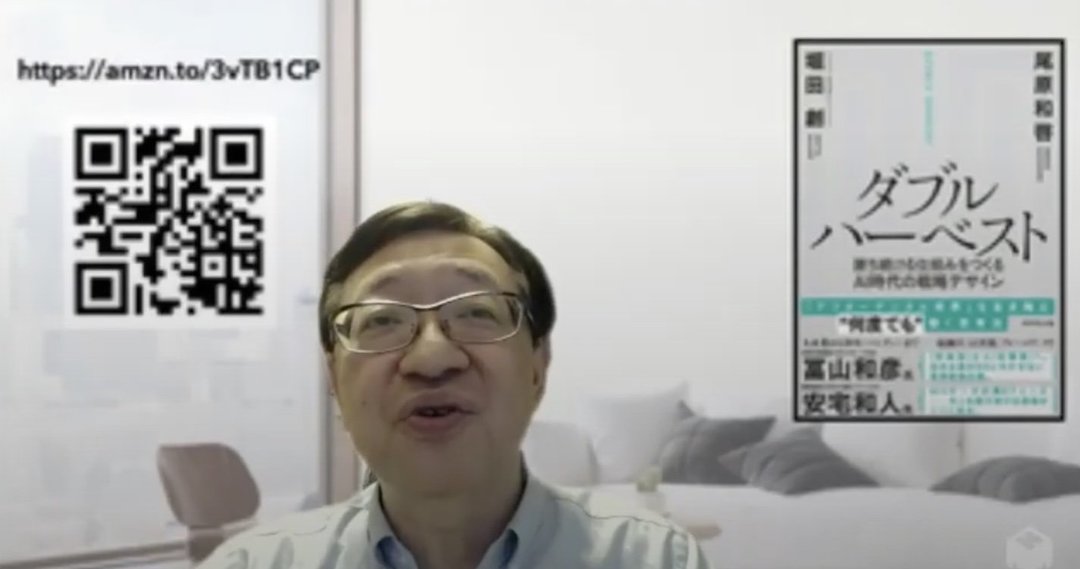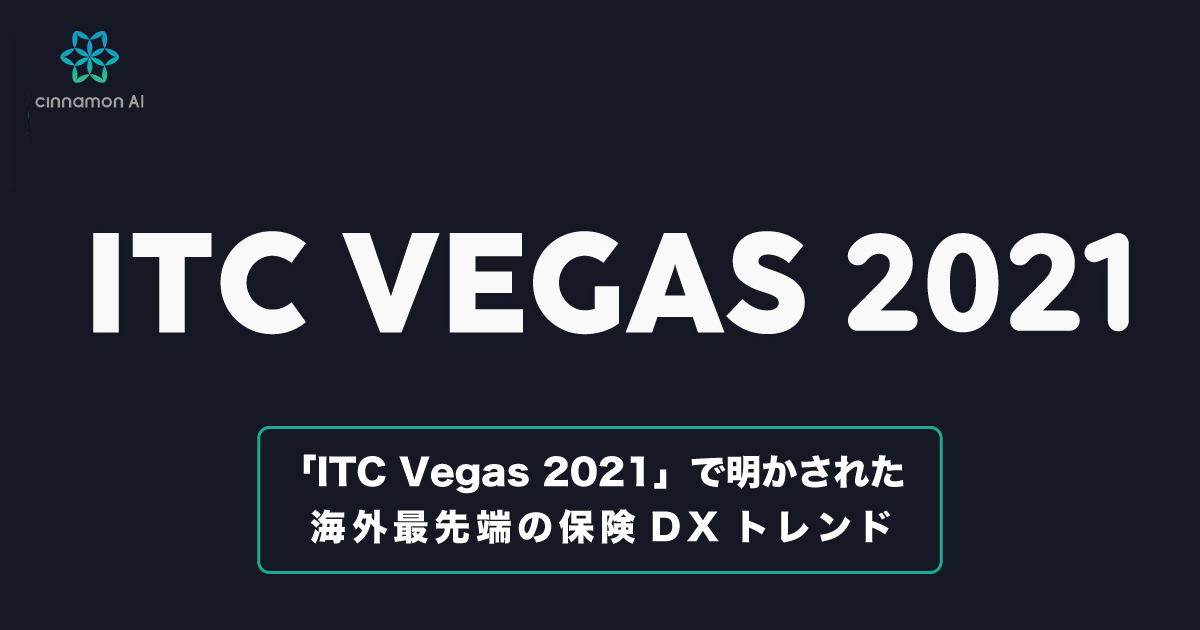blog cinnamon blog

- event
A perspective that companies lack: “We have data, but we don’t know how to use it” [Guest: Hiroaki Kitano] (Part 2)

*This article is reprinted with permission from Diamond Online.
As co-founders of "Cinnamon AI," which provides AI solutions to many companies, Hajime Hotta, who promotes DX in Japan, and Kazuhiro Ohara, who leads the Japanese IT industry with numerous bestsellers, have teamed up. ``Double Harvest: Strategic Design in the AI Era to Create a System that Continues to Win'' became the number one business book on Amazon immediately after its release, and has received rave reviews from top runners in various industries.
This talk will feature guest Hiroaki Kitano, President and Representative Director of Sony Computer Science Laboratories, who praises ``Double Harvest'' and says, ``It's content that gets to the heart of the story.It's exactly the same as what I've been talking about here and there.'' did.
Author Hotta-san and Cinnamon AI representative Hirano talk about what AI can and cannot do, what kind of data is the basis for running a harvest loop, how to incorporate AI when promoting DX, and the traps that are easy to fall into. Mirai-san asked (Composition: Yukihiro Tanaka).
Click here for the first part:A perspective that companies lack: “We have data, but we don’t know how to use it” [Guest: Hiroaki Kitano] (Part 1)

DX is not just “digital replacement”
Hiroaki Kitano (hereinafter referred to as Kitano)This is Kitano. I have been involved with Cinnamon since before its founding. Our first encounter was at the Unexplored Project of the Information-technology Promotion Agency (IPA), and I accepted Mr. Hirano's and Mr. Hotta's project. The two then founded Naked Technology, which they sold a few years later. After a while, they decided to start Cinnamon, and I invested in the first round.
This time, Mr. Hotta's ``double harvest”, I thought that the content really got to the heart of the story. DX (digital transformation) is not just about replacing it with digital technology, but it is necessary to review the entire process, and it is important to incorporate it into a business cycle called double harvest, which I have talked about here and there. It says exactly the same thing. Therefore, I would like as many people as possible to read this book and firmly advance DX and AI.

| Hiroaki Kitano Representative Director, President and Director, Sony Computer Science Laboratories Inc. In 1984, graduated from International Christian University, College of Liberal Arts, Department of Science. In 1991, obtained Ph.D. (Engineering) from Kyoto University. Joined Sony Computer Science Laboratories in 1993, and has served as Representative Director, President and Director since 2001. Representative Director and CEO of Sony AI Corporation, Managing Director of Sony Group Corporation, Professor at Okinawa Institute of Science and Technology Graduate University, Chairman of the System Biology Research Institute, and Chairman of the Artificial Intelligence Research and Development Network. |
Hajime Hotta (hereinafter referred to as Hotta)『double harvestThis is Hotta, who published ``. This book is compiled from the perspective of how to incorporate AI into business. However, if you start with the idea of ``using AI to improve your current job,'' you often end up with ``something that can be done with a little effort.'' A common problem is cost reduction, and if you use AI to do work that used to cost 100 million yen, you might be able to cut costs by 50 million yen relatively easily. However, if that happens, the next time you do it, the base will be 50 million yen, so you can only cut 20 million, 10 million yen, etc., and the story becomes smaller and smaller.Mirai Hirano (hereinafter referred to as Hirano)My name is Hirano and I am the representative of Cinnamon AI. I have been researching artificial intelligence since I was a student and started my own business, so I have been an entrepreneur for over 15 years. I've been working with Professor Kitano since I was 20 years old, so I've been looking forward to this discussion today.
What we call strategy is not to move toward such a shrinking equilibrium, but rather to accumulate data and expand our business, gradually gaining a competitive advantage. The benefits of AI will increase over time, in other words, it will follow an exponential curve, so it is essential to consider how to use AI to its full potential.
The name "Harvest" has the meaning of harvesting data. Rather than using AI to do something with existing data, the question is whether we can build a sustainable cycle of harvesting data. This is a shift in thinking from the era of hunting, where existing data resources are exhausted, to the era of agriculture, where data is cultivated and harvested sustainably. The message of this book is that by doubling the harvest loop, that is, by making double and triple crops, your business will not be able to catch up easily and will become robust.
This book introduces several examples of harvest loops, including the case of Mobileye, an Israeli venture that was acquired by Intel for 1.7 trillion yen. I highly recommend reading this book, as it thoroughly explains the steps to create a specific loop.Actually, at Cinnamon AI, we have analyzed over 300 cases, including overseas cases. . Based on this knowledge, we are proposing that your company could create this type of loop, and we are also launching a knowledge community to let as many people as possible know about it.
AI supports human work - Human in the loop
──The first theme of the discussion was ``The reality of using artificial intelligence,'' and when it comes to using AI, I think there are ``things that seem easy but are difficult, and things that seem difficult but can be done.'' But what do you think about Mr. Kitano?
KitanoIn the first place, the problems you want to solve are usually difficult even though they look easy. Although it may seem easy at first, it is often difficult to bring it to a practical level.
Also, the stage before going to AI is actually very difficult. I thought I had data, but when I looked closer, I realized that the data wasn't all there properly, or that there was too much noise to use it. Even when using deep learning, it is originally unstructured data, so when you try to actually compile it as data, it may not go well.
The other thing is that if you try hard enough, you can create a decent AI module. However, the part of properly incorporating it into the actual business process and continuously implementing it is actually not a technology theory but an organizational theory or a business model. There are a lot of stories out there of people saying that because that part hasn't been completed, they just make a prototype and that's it.
HottaWhen it comes to ``things that seem difficult but can be done,'' there are surprisingly many things that AI can do that most people think they can't do. But I can only do it a little, but I can't do it perfectly. Therefore, it is difficult to bring it to a practical level. I feel that there are various types of AI in between.
For example, the accuracy of meeting minutes and machine translation has improved, and now if you put the terms of an English contract into Google Translate, it will translate it quite accurately. If that were the case, would we no longer need a lawyer, but there is still a long way to go before we can get there. From a lawyer's point of view, the translation has not yet reached a practical level.
In other words, when looking at AI alone, it tends to be said that it cannot be used because it is not yet at a practical level, but if you ask me whether AI is of any use then that is not the case at all, and I will use it as a rough translation. There is no problem with that. In other words, if you think of AI as a support role that reduces the burden on lawyers, AI is quite capable, and this collaboration between AI and humans is called "human in the loop," and is discussed in detail in this book.
plainThat's exactly right, and there are many customers who think that AI will do everything for them. However, as AI supports people and is used, learning data will accumulate before they know it. When I tell them that it is important to create such a loop, some people say, ``I see.'' Human in the loop is the key to utilizing AI.

| Miku HiranoPhoto: Bottom left Cinnamon AI representative Serial entrepreneur. Completed graduate school at the University of Tokyo. Engaged in research on recommendation engines, complex networks, clustering, etc. It was twice selected for the IPA Unexplored Software Creation Project in 2005 and 2006. Founded Naked Technology while still in school. Develops and operates middleware that allows you to develop apps on iOS/Android/flip phones. In 2011, the company was sold to Mixi. She has received many awards both domestically and internationally, including ST.GALLEN SYMPOSIUM LEADERS OF TOMORROW, FORBES JAPAN "Entrepreneur Ranking 2020" BEST10, Woman of the Year 2019 Innovative Entrepreneur Award, VEUVE CLICQUOT BUSINESS WOMAN AWARD 2019 NEW GENERATION AWARD. He has also given a keynote speech at AWS SUMMIT 2019, Milken Institute Japan Symposium, 45th Japan-ASEAN Management Conference, Bloomberg THE YEAR AHEAD Summit 2019, etc. Since 2020, he has been appointed as a member of the Cabinet Secretariat IT Strategy Office and a special member of the Cabinet Office Tax Investigation Committee. From 2021, he will serve as an expert member of the Cabinet Office's Economic and Fiscal Policy Council. In her private life, she is a mother of two children. |
Deep learning that reproduces “craftsmanship” and “intuition”
──The next theme is "The importance of data." I think we often get the question, "The data we have now is difficult to use...What kind of data should we collect in the future?" What do you think?
HottaIn fact, there are many industries that accumulate thousands or tens of thousands of log data. I am often told by people in charge of DX things like, ``We have the data, but we lack the wisdom to know how to translate this into business value.''
However, the very idea of how to utilize this data is inherently strange. The order is completely reversed, and the original idea is to first have a goal of what you want to do, and then figure out what kind of data you need to do it. "Purpose comes first." Because the purpose is clear, we can say that we don't need this data, or that this data has high utility value.
Lemonade, an American non-life insurance startup introduced in the book, has a slogan that reads, ``Forget Everything You Know About Insurance.'' The reason why chatbots can be used to apply for insurance in just a few tens of seconds and to review insurance claims in a very short time is because it has the purpose of relieving users of their anxiety and frustration related to insurance reviews.
In order to pursue ``time savings,'' it is essential to have something like a ``credit score,'' which indicates whether an individual user can be trusted and how likely they are to make a false claim.In order to improve the accuracy of that score, You can break it down to find out what kind of data you need. Therefore, I think the correct approach is to first have a purpose for what you want to accomplish and then use that as your starting point.
KitanoThe key is to create a loop in which data is continuously generated and the quality increases the more data is collected. To achieve this, it is not enough just to introduce an AI system; it is essential to consider how the organization can change its work loop.
For example, by pushing more and more unstructured data into AI, we can see what is important in our work. By doing so, a loop begins in which tacit knowledge becomes explicit knowledge. Once it becomes explicit knowledge, it can be described and the data can be handled. Running this cycle of knowledge generation is extremely important when using AI continuously. Even if you say, ``I want more data,'' you won't be able to collect any data if you don't have a built-in structure that allows you to constantly generate data. This has been said since the 1980s.
HottaAnother important point is the part that AI can do that IT cannot, and that is similar to the "intuition" that only AI can do. Humans make many intuitive decisions and actions, which can be very valuable, but with the advent of deep learning, AI can now do things that are similar to intuitive operations. This is why what has traditionally been called craftsmanship can now be reproduced by AI. For example, AI is emerging that can detect cancer from X-ray images like a skilled doctor.
In order to turn tacit knowledge that has not been verbalized into explicit knowledge, we also need data on how doctors evaluate X-ray images. Furthermore, if we have AI explain why it made such a decision and create a feedback loop in which a human determines whether the reason is correct, knowledge management in the IT era may be on a different level. I look forward to it.

| Hajime HottaPhoto: Bottom right Cinnamon Co., Ltd. Executive Officer/Futurist Born in 1982. Since his student days, he has been consistently engaged in artificial intelligence research such as neural networks, and at the age of 25 completed the doctoral program at Keio University Graduate School of Science and Engineering (Doctor of Engineering). Selected for the "IPA Unexplored Software Creation Project" in 2005 and 2006. Joined Sirius Technologies in 2005 and was responsible for the development of AdLocal, a location-based advertising distribution system. After founding Naked Technology while in school, he sold the company to mixi. Furthermore, he co-founded Cinnamon AI, the hottest AI startup that provides artificial intelligence business solutions such as AI-OCR, speech recognition, and natural language processing (NLP). Currently, he is active as a futurist at the company and is in a position to lead talented engineers in Southeast Asia. In addition, based on our philosophy of ``continuing to be an ally of innovators,'' we also provide advisory and coaching sessions for managers and leaders. While referring to the knowledge of cognitive science, we are exploring methodologies to increase the effectiveness of people and organizations. Lives in Malaysia. 『double harvest' is his first book. |
Reprinted from: Diamond Online / Hiroaki Kitanohttps://diamond.jp/articles/-/272700
"Double Harvest"
Book details and publicationhereYou can check from here.
Recommended articles
-
 event
event -
 event
event[5 days only] Double Harvest Summit, archive distribution public page
[5 days only] Double Harvest Summit, archive distribution public page
-
 event
eventA perspective that companies lack, saying, “We have data, but we don’t know how to use it.”
A perspective that companies lack: “We have data, but we don’t know how to use it.”
